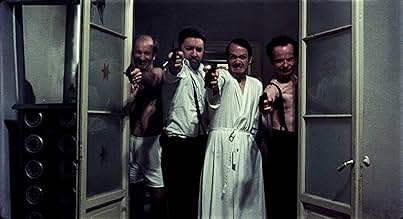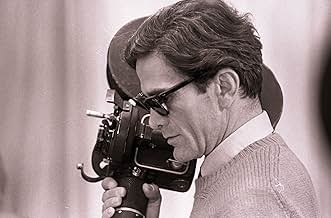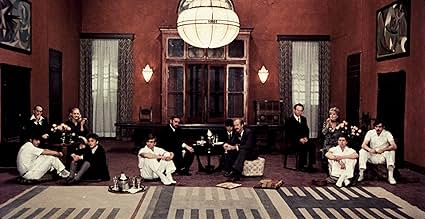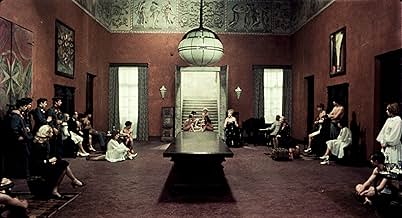
En Italie, au cours de la Seconde Guerre mondiale, quatre libertins fascistes rassemblent neuf jeunes hommes et jeunes filles et les soumettent à cent vingt jours de torture physique, mental... Tout lireEn Italie, au cours de la Seconde Guerre mondiale, quatre libertins fascistes rassemblent neuf jeunes hommes et jeunes filles et les soumettent à cent vingt jours de torture physique, mentale et sexuelle.En Italie, au cours de la Seconde Guerre mondiale, quatre libertins fascistes rassemblent neuf jeunes hommes et jeunes filles et les soumettent à cent vingt jours de torture physique, mentale et sexuelle.
- Réalisation
- Scénario
- Casting principal
- Récompenses
- 2 victoires au total
- Eccellenza
- (as Umberto P. Quintavalle)
- Signora Vaccari
- (as Helene Surgere)
Résumé
Avis à la une
Inspired by 'The 120 Days of Sodom, or the School of Libertinage' by the Marquis de Sade, the film is set in Italy during WWII and follows four fascists named The Duke, The Magistrate, The President and The Bishop. Alongside their barbaric troupe of acolytes, they put a group of eighteen children through a Dantesque cycle of torture and perversion.
Completely unremitting in its' depiction of depravity and offering the viewer no respite from scenes of brutality at any point during its' runtime, the film makes for a fascinatingly violent viewing experience that is uncomfortable and unforgettable.
It may be easier to start discussing the definitive positive elements of the movie. The cinematography and shot construction is undeniably beautiful and artistic. The images on screen are strange, perverse and off-putting, but captured with style and skill behind the camera- a credit to the work of cinematographer Tonino Delli Colli. The stirring soundtrack makes effective use of pieces by Chopin, Bach and others, while Ennio Morricone's original score is haunting.
The film also benefits from having a cast full of dedicated, brave performers, whose work lingers in the mind long after the film has ended. The actors playing the four fascist libertines are all outlandishly, disgustingly terrific, with Giorgio Cataldi and Aldo Valetti being particularly memorable as The Bishop and The President respectively. As one of their accomplices, Hélène Surgère also does admirable work, but it's hard to appreciate the performances when the characters are so detestable and despicable and the actions they perform so thoroughly base.
This is the problem with the whole film actually: it's hard to appreciate because Pasolini was so committed to showing the audience nothing but cruelty. 'Salò' could be seen as an allegory about the corrupting effect of absolute power, of the extreme savagery man is capable of when they have no inhibitions, shame or empathy. By showing us nothing but repetitive scenes of torture to illustrate this theme, though, the film seems a little cursory in its' examinations of same. A cynical critic might say it's a very one-note movie, that note being one of sadism, pain and disgust.
On the other hand, one might say that it is important for artists like Pasolini to hold truth to power in their work. While the film is based on the writings of the Marquis de Sade, by updating the film to a WWII setting, Pasolini can make commentary on the barbarism of the fascists during that war.
When the allies were liberating concentration camps, lampshades made with human skin were found. The twisted, unnecessarily cruel experiments Dr. Josef Mengele performed on children are well documented, as well as other countless acts of sadism undertaken by the fascists who enjoyed absolute power at the time.
One could say Pasolini is giving us an account of the viciousness that took place during WWII that cannot be forgotten or obfuscated by history- the film will always be around to remind us of where humanity went wrong. Except, 'Salò' is largely confined to an isolated mansion, which sets the proceedings apart from the war or real life. This gives the film an odd, otherworldly feeling that in turn makes trying to contemporize or understand it in a real-world context incredibly difficult and somewhat pointless, even if that is what Pasolini intended.
Say what you will about 'Salò', it does make you think and will certainly make you feel something- it is a visceral and intellectual experience. It's also a thoroughly uncomfortable one, featuring nearly two hours of torture and sexual perversion with no break for the viewer from the unceasing depravity whatsoever. It's not a film someone will say they enjoyed- and if they do be wary of that person- but it can be somewhat rewarding.
It is certainly unique and deserves its' infamous reputation as one of the most challenging pieces of cinema ever made. It is a film that will likely provoke different reactions from everyone who sees it- some will hate it and others will hail it as a masterpiece.
There are those of us whose feelings about the film are constantly in flux, who think they can see what Pasolini intended but don't think his ideas were expressed as eloquently as they could have been. Whatever the case and whatever your feelings are on the film, 'Salò, or the 120 Days of Sodom' is an uncompromising journey into a world of depravity that is sure to leave an indelible impression on the viewer.
They had to show that they released it somewhere in the U.S. or territories.
So they did. In a small theater in El Condado area near San Juan, Puerto Rico.
There's where I saw it. In the mid-70's. With the film company's name on it.
Is it any good? Well, I'm no great admirer of Pasolini. Frankly, I find his movies intolerable. And "Saló" is no exception. But, unlike his Trilogy of Life ("The Decameron", "Canterbury Tales", "Arabian Nights") where he at least displayed some flair and humor, this one is a different animal.
His style was always somewhat ponderous. In "Saló" it is heavily, oppressively didactic: static tableaux-style framing, a deliberately slow pace, no humor whatsoever, and actors who don't play characters but conceits. Although Pasolini uses De Sade's "120 Days of Sodom" as scaffolding and as a pointed commentary, "Saló" is actually based on real events that happened in the Republic of Saló in Northern Italy, where a group of wealthy fascists abducted a large group of young men and women, went on to debase them, and after they were done with them they killed them. Pasolini staged all the scenes as demonstrations of degradation and cruelty. And he does not flinch.
At the end he includes a bibliography.
It's an unpleasant experience.
Clearly, Pasolini, an award-winning poet and one of the leading intellectuals of his time, was very angry when he did this moving picture. He wanted to send a message to Italy and to the world.
It was his last film.
Months later he was murdered.
After several weeks of being in release, the theater was raided by our local vice authorities.
*** 1/2 (out of 4)
Nine young boys and nine young girls are gathered up and taken from their homes. They are taken to a secluded castle in Italy during WWII where they hear a variety of perverted stories while their captures sexually and mentally abuse them.
Pier Paolo Pasolini would be murdered before the release of this, his final film and many still seem to think it wasn't a random murder. Many people believe that his politics had some higher ups order his murder but it's doubtful we'll ever know what the truth was. With that said, this final film of his is certainly unlike anything you're ever going to see as it's about as depraved, disgusting and depressing as you're going to get. I personally think SALO, OR THE 120 DAYS OF SODOM is a very good movie but it's hard to really recommend it to anyone.
Based on the work of Marquis de Sade, this film is about as disturbing as everything put to film. The real debate is rather this is some sort of serious art film with a message or is it just a cheap piece of exploitation that was meant to make you sick. I mean, certain horror movies are trashed for their disgusting scenes of violence and sexual brutality but how many movies are actually worse than this one? Not only do you get disgusting stories being told ranging from child rape to people being forced to eat poop but we have to see these things as well. This is a film that really works on the viewers mind so it's going to be up to that viewer whether they take it in as art or some sort of exploitation.
For my money, the film is a piece of art. I'm not going to say what the director was trying to do or say with the picture but to me this film works because it seems very real. It seems like you're really there watching these horrible events and the film really doesn't back down at anything. The stories are rather brutal and we get scenes of such sexual depravity that you can't help but be disturbed. There really isn't any style here because the camera just captures the horrors that are there. The performances are raw, realistic and just add to the horrors of the story.
Obviously, not everyone is going to be able to take this film and I really can't say I'd blame anyone for turning it off. Again, we can debate the politics and message of the film but there's no question that when the end credits start you're going to need a shower.
Le saviez-vous
- AnecdotesDespite the grim subject throughout the film, in an interview on the second disc of the Criterion Collection box set, actress Hélène Surgère claimed the mood was actually rather jovial on the set and that none of the teenage actors were actually harmed or traumatized. She said the abundance of teenagers who had never acted before led the mood to be happy and at times, even fun, with the cast often playing practical jokes on each other. She also said that the movie was literally "made" in the editing room and the filmmakers had no idea how grim a movie it was until they saw the finished product at the premiere.
- GaffesWhen the Duke kisses several victims during Sergio and Renata's wedding, some victims and Ezio begin to laugh, off the character.
- Citations
The President: [while eating a meal of feces] Carlo, do this with your fingers.
[the President sticks two fingers in his mouth]
The President: And say, "I can't eat rice with my fingers like this."
Male Victim: [with fingers in his mouth] I can't eat rice.
The President: Then eat shit, you little bastard.
- Crédits fousEssential Bibliography: Roland Barthes: 'Sade, Fourier, Loyola' (Editions du Seuil); Maurice Blanchot: "Lautréamont et Sade' (Editions de Minuit; in Italy Dedalo Libri); Simone de Beauvoir: 'Faut-il brûler Sade' (Editions Gaimard); Pierre Klossowski: 'Sade mon prochain, le philosophe scélérat' (Editions du Seuil; in Italy SugarCo Edizioni); Philippe Sollers: 'L'écriture et l'experience des limites' (Editions du Seuil)
- Versions alternativesThe film was rejected for cinema by the BBFC in 1976 and a private showing of the uncut version at the Old Compton Cinema Club in London's Soho resulted in a police raid and confiscation of the movie. A heavily edited version - minus 6 minutes of footage including scenes of torture, homosexuality and excrement eating, and including a 4 minute prologue describing the history of the town of Salo - was later prepared by UK censor James Ferman for club showings. The film was finally passed completely uncut for cinema and video in the UK in December 2000.
- ConnexionsEdited into Histoire(s) du cinéma: Une histoire seule (1989)
- Bandes originalesPrelude in C minor
(uncredited)
Composed by Frédéric Chopin (uncredited)
Played by Arnaldo Graziosi (uncredited)
Meilleurs choix
Détails
- Date de sortie
- Pays d’origine
- Langues
- Aussi connu sous le nom de
- Saló o los 120 días de Sodoma
- Lieux de tournage
- Sociétés de production
- Voir plus de crédits d'entreprise sur IMDbPro
Box-office
- Montant brut mondial
- 1 808 595 $US
- Durée1 heure 57 minutes
- Mixage
- Rapport de forme
- 1.85 : 1

![Trailer [OV]](https://m.media-amazon.com/images/M/MV5BYTczYWExODUtNmQ3NC00MzRhLTkwMGQtNzRjM2M5ZGQzYmVkXkEyXkFqcGdeQXRyYW5zY29kZS13b3JrZmxvdw@@._V1_QL75_UX500_CR0)

























